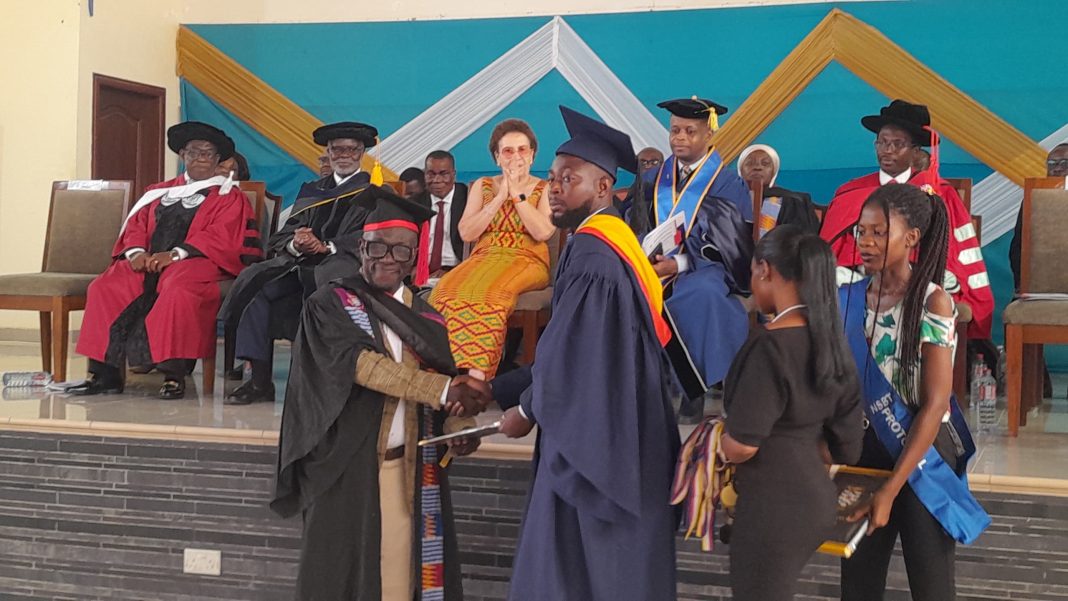By Prince Acquah
Elmina, June 02, GNA – The Nduom School of Business and Technology (NSBT) has reiterated its commitment to practical learning and producing industry-ready graduates.
This is demonstrated by internship and attachment opportunities offered to students in the various Group Nduom (GN) Companies operating across several fields to prepare them for the job market.
The school gave the assurance at its second congregation and fourth matriculation ceremony, in Elmina, in the Central Region.
It was held under the theme: “Empowering graduates to drive innovation and creativity for economic growth and development.”
The graduates pursued various courses including BSc. Banking and Finance, BSc. Information and Communication Technology, BSc Information and Technology Management, and Diploma in Management Studies.
Ms Constance Yvette Owusu, the school’s first female SRC President, was adjudged the overall best student for 2023 while Mr David Malik Acquah graduated as the overall best student for 2024.

Another female, Ms Vera Frimpong was the overall best graduating diploma student for 2024.
Dr Papa Kwesi Nduom, Chairman of the Governing Board of GN, speaking at the ceremony, underscored the importance of strong industry-academia partnership.
He indicated that the practical experience given to the students made the school and its graduates unique.
Dr Nduom said: “We prepare them to be productive after they leave here, and so we take attachments and work experience very seriously.
“We have asked all the Group Nduom companies to make room for the students to experience work and real life.”
Dr Nduom made the remarks at the school’s second congregation and fourth matriculation ceremony in Elmina.

Under the mentorship of the University of Cape Coast (UCC), the school graduated a total of 25 students who completed in 2023 and 2024, comprising of 14 males and 11 females.
Of the number, three students graduated with first class, 14 with second class upper, five with second class lower, two with third class and one with a pass.
Concurrently, NSBT officially welcomed 62 new students to pursue various degree and diploma programmes.
As a demonstrable commitment to practical training, some four students who joined the GN Electronics company to successfully assemble 100 television sets were celebrated.
Concerning the TV sets, Dr Nduom said: “The TVs are working, and they are now beginning to sell them to the general market.
“They are available now here in Elmina and anybody who wants one can buy one,” Dr Nduom said.
He noted that GN Electronics encountered some challenges recently but was now recovering, pledging to ramp up its operations.
“This first set has been tested and everything is good, we will continue to get some more parts and assemble more and make it a continuous affair.”
In the area of banking, Dr Nduom expressed the hope of getting back his banking license soon to complete and operate a stalled bank project on campus for teaching and learning.
“As soon as that happens, we are not just going to use the building and facility for teaching but there will be practical experience for students to know how to do all aspects of banking so that they will graduate with some experience in banking,” he added.
He stressed that graduates of the school stood out because of the school’s philosophy hinged on leadership, light and talent.
Dr Nduom announced efforts by the school to acquire a charter to become a full-blown university.
“We believe the occasion should be an assurance to the public that Nduom School of Business and Technology will continue to progress and deliver the kind of education relevant to today’s world,” Dr Nduom added.
Rev Prof Daniel Adjepong Nyarko, the Rector of the school, said the education given to the students was unique as they passed through vigorous training.
To make their graduates stand out, they were thought to be ethical and follow rules and regulations to the latter.

The French language was also a compulsory course for students, positioning them to fit perfectly everywhere in the world, he added.
“French is important to us because all the countries surrounding us speak French. We need to be very much intentional about teaching our students the French language,” he stressed.
Prof Nyarko entreated the graduates to demonstrate the skills and knowledge acquired from the school for the benefit of their immediate communities and the country at large.
GNA
Edited by Alice Tettey/Benjamin Mensah
